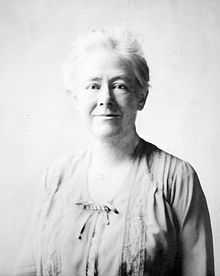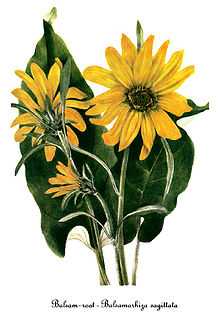Mary Vaux Walcott
| Mary Vaux Walcott | |
|---|---|
 | |
| Born | July 31, 1860 |
| Died | August 22, 1940 |
| Nationality | United States |
| Institutions | Smithsonian Institution |
Mary Morris Vaux Walcott (July 31, 1860 – August 22, 1940) was an American artist and naturalist known for her watercolor paintings of wildflowers.
Life


She was born in Philadelphia, Pennsylvania to a wealthy Quaker family. After graduating from the Friends Select School in Philadelphia in 1879, she took an interest in watercolor painting. When she was not working on the family farm, she began painting illustrations of wildflowers that she saw on family trips to the Rocky Mountains of Canada.[1] During the family summer trips, she and her brothers studied mineralogy and recorded the flow of glaciers in drawings and photographs.[2] The trips to the Canadian Rockies sparked her interest in geology.[1]
At the age of nineteen her mother died and she took the responsibility of looking after her two younger brothers and her father. After 1887, she and her brothers when back to western Canada almost every summer. During this time she became an active mountain climber, outdoors woman, and photographer. One summer a botanist ask her to paint a rare blooming arnica and she was successful with this, which encouraged her to concentrate on botanical illustration. She spent many years exploring the rugged terrain of the Canadian Rockies to find important flowering species to paint & in 1887 on her first transcontinental trip via rail wrote an important & lengthy travel journal that is the subject of a recent article by Marjorie G. Jones in the journal Quaker History. .[2]
Over her father's fierce objections, Walcott married the paleontologist Charles Doolittle Walcott, who was the Secretary of the Smithsonian Institution, in 1914, when she was 54. She played an active part in her husband's projects, returning to the Rockies with him several times and continuing her hobby of painting the wildflowers there. In 1925, the Smithsonian published some 400 of her illustrations, accompanied by brief descriptions, in a five-volume work entitled North American Wild Flowers. In Washington Mary became a close friend of First Lady Lou Henry Hoover & raised money to erect the Florida Avenue Meeting House, so that the first Quaker President & his wife would have a proper place to worship. The extensive correspondence between Mary Walcott & Lou Hoover is the subject of another article by Marjorie G. Jones in the spring 2014 edition of Quaker History.
From 1927 to 1932 Walcott served on the federal Board of Indian Commissioners & driven by her chauffeur, travelled extensively throughout the American West, diligently visiting reservations. Unfortunately, however, reflecting prevalent attitudes of her day, her reports are laced with criticisms of "lazy" & "ungrateful" Indians.
When she was 75, she made her first trip abroad to Japan to visit lifelong friend & fellow Philadelphia Quaker, Mary Elkington Nitobe, who had married Japanese diplomat Inazo Nitobe.
She was elected president of the Society of Woman Geographers in 1933. In 1935, the Smithsonian published Illustrations of North American Pitcher-Plants, which included 15 paintings by Walcott. Following the death of her husband in 1927, Walcott established the Charles Doolittle Walcott Medal in his honor. It is awarded for scientific work on pre-Cambrian and Cambrian life and history. Walcott died in St. Andrews, New Brunswick.[1]
Legacy
A mountain, called Mount Mary Vaux, in Jasper National Park, Alberta, Canada is named after her. It is located at 52°33′0″N 117°27′10″W / 52.55000°N 117.45278°W.[1]
Selected works
| Wikimedia Commons has media related to Mary Vaux Walcott. |
- North American Wildflowers, 5 vols., pub. by the Smithsonian Institution, 1925, repub. 1988 ISBN 0-517-64269-7
- 15 paintings in Illustrations of American Pitcherplants, pub. by the Smithsonian Institution, 1935
References
- ↑ 1.0 1.1 1.2 1.3 "Mary Vaux Walcott". Harvard Forest. Retrieved 30 January 2014.
- ↑ 2.0 2.1 "Mary Vaux Walcott". Smithsonian American Art Museum. Retrieved 30 January 2014.
- ↑ "Author Query for 'M.Walcott'". International Plant Names Index.
External links
- Encyclopædia Britannica entry for Mary Morris Vaux Walcott
- Mount Mary Vaux
- Images of paintings from the Southwest School of Botanical Medicine
|